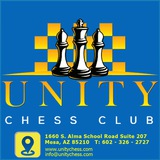📕 20.Qe1!
Stronger than 20 Qe2. It is important to protect the c3 bishop as a preparation for the f2-f3 lever.
Bad is 20.Qc2 as now, f5 cannot be met with 21.f3? due to 21...Bxc5! dxc5 22.Qxc5+ Kh1 23.b4 and Black even wins because of the unfortunate position of White's queen.
Stronger than 20 Qe2. It is important to protect the c3 bishop as a preparation for the f2-f3 lever.
Bad is 20.Qc2 as now, f5 cannot be met with 21.f3? due to 21...Bxc5! dxc5 22.Qxc5+ Kh1 23.b4 and Black even wins because of the unfortunate position of White's queen.
📘 17.Rxb7!!
A strong exchange sacrifice. The mighty knight on the d5-outpost and The poor position of Black's Knight at b7, completely compensate it.
A strong exchange sacrifice. The mighty knight on the d5-outpost and The poor position of Black's Knight at b7, completely compensate it.
📕Unity Chess Multiple Choice 329
A: b2 – 10
👍👍👍👍👍👍👍 67%
C: Bf6 – 3
👍👍 20%
B: Nb8 – 2
👍 13%
👥 15 people voted so far.
A: b2 – 10
👍👍👍👍👍👍👍 67%
C: Bf6 – 3
👍👍 20%
B: Nb8 – 2
👍 13%
👥 15 people voted so far.
📕Unity Chess Multiple Choice 330
C: Nc4 – 9
👍👍👍👍👍👍👍 60%
A: e5 – 3
👍👍 20%
B: a×b6 – 3
👍👍 20%
👥 15 people voted so far.
C: Nc4 – 9
👍👍👍👍👍👍👍 60%
A: e5 – 3
👍👍 20%
B: a×b6 – 3
👍👍 20%
👥 15 people voted so far.
17th & final round, FIDE Zonal Tournament, The Hague, 7th Oct 1966. Hungarian grandmaster István Bilek is in play v. Guy Mazzoni (Italy). Bilek won this game to finish 2nd behind Yugoslav grandmaster Svetozar Gligorić, who looks on.
@UnityChess
@UnityChess
Hungarian grandmaster Gyula Sax (1951-2014), pictured at Tilburg, Netherlands, November 1979.
@UnityChess
@UnityChess
Former World Champion Boris Spassky in play v. Aleksandr Beliavsky in the opening round of the Tilburg 'Interpolis' tournament, 2nd October 1981.
@UnityChess
@UnityChess
This media is not supported in your browser
VIEW IN TELEGRAM
The latest Chess Notes item points out a website with this great footage of Akiba Rubinstein. http://bit.ly/2GfkwYa
@UnityChess
@UnityChess
🔹 Reuben Fine
🔹 American Chess Grandmaster and Psychologist
♦️ Reuben Fine was an American chess grandmaster, psychologist, university professor, and author of many books on both chess and psychology.
▪️ Full name: Reuben Fine
▪️ Country: United States
▪️ Born: October 11, 1914
New York City
▪️ Died: March 26, 1993 (aged 78)
New York City
▪️ Title: Grandmaster
♦️Reuben Fine was born in 1914. He grew up in New York City and first learned to play chess at the age of eight. After winning several strong American tournaments as a youth, Fine turned to international competition. He played on three US Olympiad teams from 1933 to 1937, winning one gold and one silver individual medal, while all three teams finished first.
After World War II, he was offered an invitation to the World Championship tournament in 1948, but declined to participate. He retired from chess a few years later in order to pursue a career in psychology. In his foreshortened career, Fine played tournament games against five world champions. He had overall plus scores against Emanuel Lasker, Alexander Alekhine, and Mikhail Botvinnik, and even records against Jose Raul Capablanca and Max Euwe.
He was an author of note, his most recognized works being Ideas Behind the Chess Openings and Basic Chess Endings.
♦️ A memorable game by Fine which known "Every Fine Boy Does Good" in chessgames.com👇🏼👇🏼
🔸 Reuben Fine vs Emanuel Lasker
🔸 Nottingham (1936), Nottingham ENG, rd 1, Aug-10
🔸 Queen's Gambit Declined: Three Knights Variation. General (D37)
♦️Review and download PGN file (Analysed bt Alekhine)👇🏼👇🏼
@unitychess
🔹 American Chess Grandmaster and Psychologist
♦️ Reuben Fine was an American chess grandmaster, psychologist, university professor, and author of many books on both chess and psychology.
▪️ Full name: Reuben Fine
▪️ Country: United States
▪️ Born: October 11, 1914
New York City
▪️ Died: March 26, 1993 (aged 78)
New York City
▪️ Title: Grandmaster
♦️Reuben Fine was born in 1914. He grew up in New York City and first learned to play chess at the age of eight. After winning several strong American tournaments as a youth, Fine turned to international competition. He played on three US Olympiad teams from 1933 to 1937, winning one gold and one silver individual medal, while all three teams finished first.
After World War II, he was offered an invitation to the World Championship tournament in 1948, but declined to participate. He retired from chess a few years later in order to pursue a career in psychology. In his foreshortened career, Fine played tournament games against five world champions. He had overall plus scores against Emanuel Lasker, Alexander Alekhine, and Mikhail Botvinnik, and even records against Jose Raul Capablanca and Max Euwe.
He was an author of note, his most recognized works being Ideas Behind the Chess Openings and Basic Chess Endings.
♦️ A memorable game by Fine which known "Every Fine Boy Does Good" in chessgames.com👇🏼👇🏼
🔸 Reuben Fine vs Emanuel Lasker
🔸 Nottingham (1936), Nottingham ENG, rd 1, Aug-10
🔸 Queen's Gambit Declined: Three Knights Variation. General (D37)
♦️Review and download PGN file (Analysed bt Alekhine)👇🏼👇🏼
@unitychess
